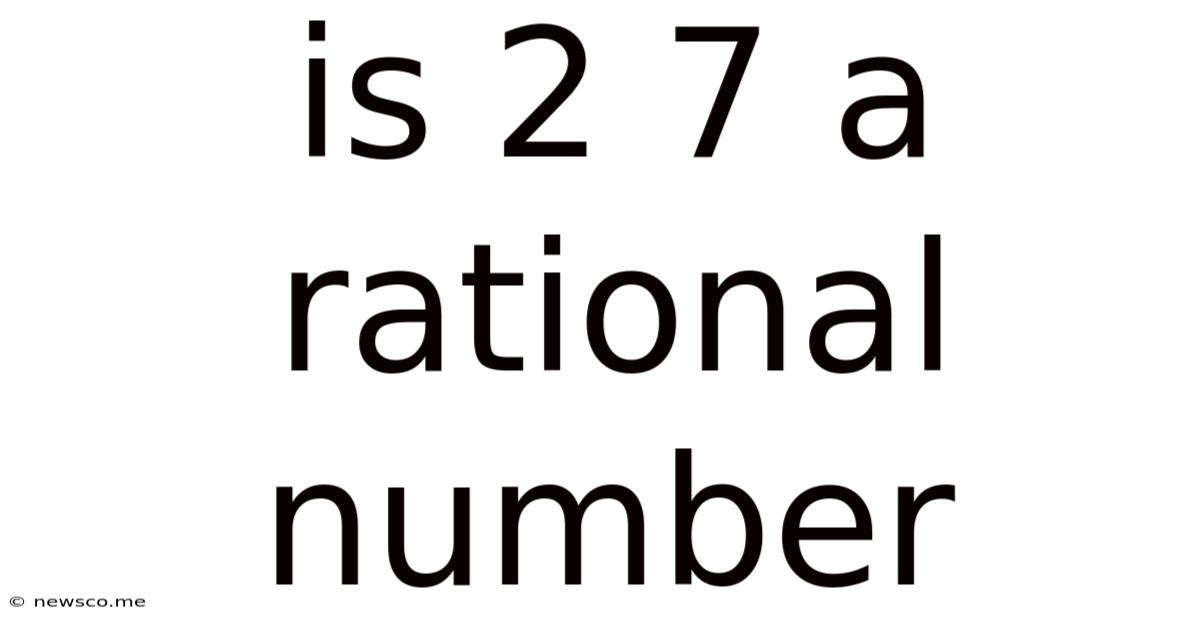Is 2 7 A Rational Number
News Co
May 07, 2025 · 4 min read

Table of Contents
Is 2/7 a Rational Number? A Deep Dive into Rational and Irrational Numbers
The question, "Is 2/7 a rational number?" might seem simple at first glance. However, understanding the answer requires a solid grasp of what constitutes a rational number and how it differs from its irrational counterpart. This article will not only definitively answer the question but also explore the broader concepts of rational and irrational numbers, providing a comprehensive understanding of these fundamental mathematical concepts.
Understanding Rational Numbers
A rational number is any number that can be expressed as the quotient or fraction p/q of two integers, where p is the numerator and q is the non-zero denominator. In simpler terms, a rational number is a number that can be written as a fraction. Crucially, the fraction must be composed of integers (whole numbers, including zero and negative numbers).
Key Characteristics of Rational Numbers:
- Expressible as a fraction: This is the defining characteristic. If a number can be written as a fraction of two integers, it's rational.
- Terminating or repeating decimals: When a rational number is expressed in decimal form, it will either terminate (end) or have a repeating pattern of digits. For example, 1/4 = 0.25 (terminating) and 1/3 = 0.333... (repeating).
- Includes integers: All integers are rational numbers because they can be expressed as a fraction with a denominator of 1 (e.g., 5 = 5/1).
- Includes zero: Zero is a rational number (0/1).
Understanding Irrational Numbers
Irrational numbers, on the other hand, cannot be expressed as a simple fraction of two integers. Their decimal representations are neither terminating nor repeating; they continue infinitely without any predictable pattern.
Key Characteristics of Irrational Numbers:
- Non-repeating, non-terminating decimals: This is their defining feature. The decimal expansion goes on forever without ever settling into a repeating sequence.
- Examples: Famous irrational numbers include π (pi), approximately 3.14159..., and the square root of 2 (√2), approximately 1.41421...
- Cannot be expressed as a fraction: This is the crucial distinction from rational numbers. No matter how hard you try, you cannot find two integers that, when divided, will perfectly represent an irrational number.
Answering the Question: Is 2/7 a Rational Number?
Now, let's return to the original question: Is 2/7 a rational number? The answer is a resounding yes.
Why?
The number 2/7 is already expressed in the form p/q, where p = 2 and q = 7. Both 2 and 7 are integers. This perfectly satisfies the definition of a rational number. Therefore, 2/7 is definitively a rational number.
Furthermore, if we convert 2/7 to its decimal representation using long division, we get 0.285714285714..., which demonstrates a repeating decimal pattern (285714). This repeating decimal is another characteristic that confirms its rational nature.
Exploring Different Representations of Rational Numbers
It's important to understand that rational numbers can be represented in multiple ways. While 2/7 is one representation, it's equivalent to other fractions like 4/14, 6/21, and so on. All these fractions represent the same rational number, even though they look different. This equivalence highlights the flexibility in representing rational numbers.
The decimal representation, 0.285714285714..., provides another way to express the same rational number. This shows the connection between fractional and decimal representations of rational numbers.
Further Applications and Examples of Rational Numbers in Everyday Life
Rational numbers are ubiquitous in everyday life, underpinning many aspects of our world. Here are some examples:
- Measurements: Most measurements involve rational numbers. For instance, a length of 2.5 meters is a rational number (5/2).
- Finance: Dealing with money inherently involves rational numbers. $2.75 is a rational number (11/4).
- Fractions in recipes: Recipes often call for fractional amounts of ingredients, such as 1/2 cup of sugar or 2/3 cup of flour.
- Ratio and proportion problems: Many mathematical problems involving ratios and proportions use rational numbers.
Distinguishing between Rational and Irrational Numbers: A Practical Approach
While the theoretical definitions are crucial, here's a practical approach to distinguish between rational and irrational numbers:
- Try to express it as a fraction of integers: If you can find two integers that, when divided, equal the number, it's rational.
- Check the decimal representation: If the decimal representation terminates or repeats, it's rational. If it's non-terminating and non-repeating, it's irrational.
Conclusion: The Significance of Rational Numbers in Mathematics
Rational numbers form a cornerstone of mathematics. They are the foundation upon which many other mathematical concepts are built. Understanding the properties of rational numbers is essential for comprehending more advanced mathematical topics, including real numbers, calculus, and beyond. This article has provided a detailed exploration of rational numbers, emphasizing their definition, characteristics, and applications, ultimately confirming that 2/7 is indeed a rational number. The ability to confidently identify and manipulate rational numbers is a key skill in mathematical literacy and problem-solving. The distinction between rational and irrational numbers provides a fundamental framework for understanding the richness and complexity of the number system.
Latest Posts
Related Post
Thank you for visiting our website which covers about Is 2 7 A Rational Number . We hope the information provided has been useful to you. Feel free to contact us if you have any questions or need further assistance. See you next time and don't miss to bookmark.